PROFILE
Page 30
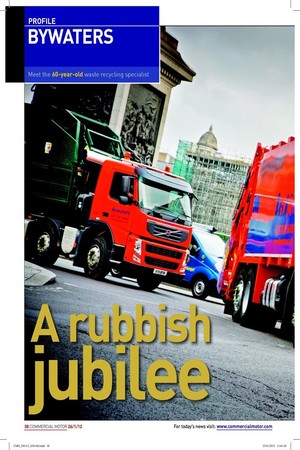
Page 31
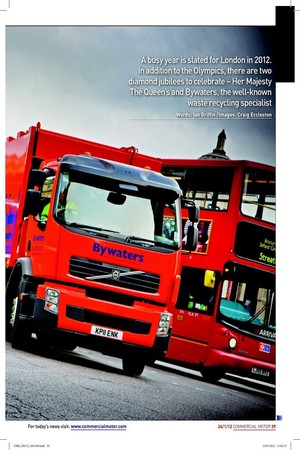
Page 32
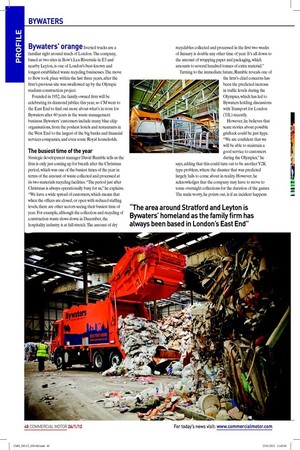
Page 33
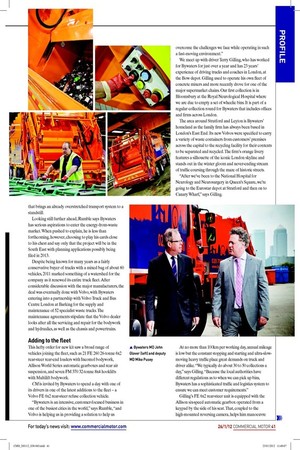
Page 34
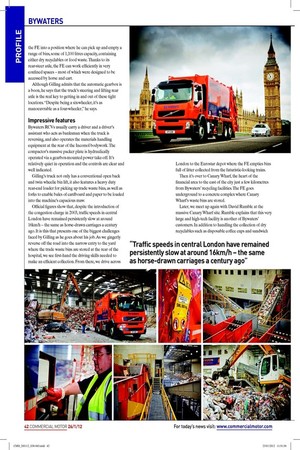
Page 35
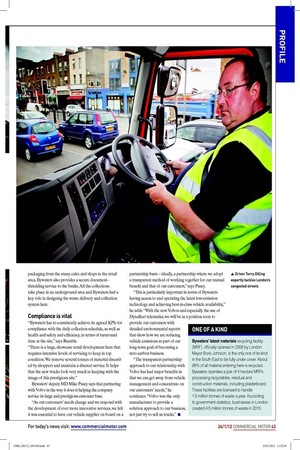
If you've noticed an error in this article please click here to report it so we can fix it.
BYWATERS
Meet the 60-year-old waste recycling specialist
rubbis
A busy year is slated for London in 2012. In addition to the Olympics, there are two diamond jubilees to celebrate – Her Majesty The Queen’s and Bywaters, the well-known waste recycling specialist
Words: Ian Griffin /Images: Craig Eccleston Bywaters' orange liveried trucks are a familiar sight around much of London. The company, based at two sites in Bow’s Lea Riverside in E3 and nearby Leyton, is one of London’s best-known and longest established waste recycling businesses. The move to Bow took place within the last three years, after the irm’s previous site was swallowed up by the Olympic stadium construction project.
Founded in 1952, the family-owned irm will be celebrating its diamond jubilee this year, so CM went to the East End to ind out more about what’s in store for Bywaters after 60 years in the waste management business. Bywaters’ customers include many blue chip organisations, from the poshest hotels and restaurants in the West End to the largest of the big banks and inancial services companies, and even some Royal households.
The busiest time of the year
Strategic development manager David Rumble tells us the irm is only just coming up for breath after the Christmas period, which was one of the busiest times of the year in terms of the amount of waste collected and processed at its two materials recycling facilities. “The period just after Christmas is always operationally busy for us,” he explains. “We have a wide spread of customers, which means that when the ofices are closed, or open with reduced stafing levels, there are other sectors seeing their busiest time of year. For example, although the collection and recycling of construction waste slows down in December, the hospitality industry is at full stretch. The amount of dry recyclables collected and processed in the irst two weeks of January is double any other time of year. It’s all down to the amount of wrapping paper and packaging, which amounts to several hundred tonnes of extra material.” Turning to the immediate future, Rumble reveals one of the irm’s chief concerns has been the predicted increase in trafic levels during the Olympics, which has led to Bywaters holding discussions with Transport for London (TfL) recently.
However, he believes that scare stories about possible gridlock could be just hype. “We are conident that we will be able to maintain a good service to customers during the Olympics,” he says, adding that this could turn out to be another Y2K type problem, where the disaster that was predicted largely fails to come about in reality. However, he acknowledges that the company may have to move to some overnight collections for the duration of the games. The main worry, he points out, is if an incident happens that brings an already overstretched transport system to a standstill.
Looking still further ahead, Rumble says Bywaters has serious aspirations to enter the energy-from-waste market. When pushed to explain, he is less than forthcoming, however, choosing to play his cards close to his chest and say only that the project will be in the South East with planning applications possibly being iled in 2013.
Despite being known for many years as a fairly conservative buyer of trucks with a mixed bag of about 60 vehicles, 2011 marked something of a watershed for the company as it renewed its entire truck leet. After considerable discussion with the major manufacturers, the deal was eventually done with Volvo, with Bywaters entering into a partnership with Volvo Truck and Bus Centre London at Barking for the supply and maintenance of 52 specialist waste trucks. The maintenance agreements stipulate that the Volvo dealer looks after all the servicing and repair for the bodywork and hydraulics, as well as the chassis and powertrains.
Adding to the fleet
This hefty order for new kit saw a broad range of vehicles joining the leet, such as 21 FE 260 26-tonne 6x2 rear-steer rear-end loaders with Incomol bodywork, Allison World Series automatic gearboxes and rear air suspension, and seven FM 370 32-tonne 8x4 hooklifts with Multilift bodywork.
CM is invited by Bywaters to spend a day with one of its drivers in one of the latest additions to the leet – a Volvo FE 6x2 rear-steer refuse collection vehicle.
“Bywaters is an intensive, customer-focused business in one of the busiest cities in the world,” says Rumble, “and Volvo is helping us in providing a solution to help us overcome the challenges we face while operating in such a fast-moving environment.” We meet up with driver Terry Gilling, who has worked for Bywaters for just over a year and has 23 years’ experience of driving trucks and coaches in London, at the Bow depot. Gilling used to operate his own leet of concrete mixers and more recently drove for one of the major supermarket chains. Our irst collection is in Bloomsbury at the Royal Neurological Hospital where we are due to empty a set of wheelie bins. It is part of a regular collection round for Bywaters that includes ofices and irms across London.
The area around Stratford and Leyton is Bywaters’ homeland as the family irm has always been based in London’s East End. Its new Volvos were speciied to carry a variety of waste containers from customers’ premises across the capital to the recycling facility for their contents to be separated and recycled. The irm’s orange livery features a silhouette of the iconic London skyline and stands out in the winter gloom and never-ending stream of trafic coursing through the maze of historic streets.
“After we’ve been to the National Hospital for Neurology and Neurosurgery in Queen’s Square, we’re going to the Eurostar depot at Stratford and then on to Canary Wharf,” says Gilling.
At no more than 100km per working day, annual mileage is low but the constant stopping and starting and ultra-slowmoving heavy trafic place great demands on truck and driver alike. “We typically do about 30 to 50 collections a day,” says Gilling. “Because the local authorities have different regulations as to when we can pick up bins, Bywaters has a sophisticated trafic and logistics system to ensure we can meet customer requirements.” Gilling’s FE 6x2 rear-steer unit is equipped with the Allison six-speed automatic gearbox operated from a keypad by the side of his seat. That, coupled to the high-mounted reversing camera, helps him manoeuvre the FE into a position where he can pick up and empty a range of bins, some of 1,100 litres capacity, containing either dry recyclables or food waste. Thanks to its rear-steer axle, the FE can work eficiently in very conined spaces – most of which were designed to be accessed by horse and cart.
Although Gilling admits that the automatic gearbox is a boon, he says that the truck’s steering and lifting rear axle is the real key to getting in and out of these tight locations. “Despite being a six-wheeler, it’s as manoeuvrable as a four-wheeler,” he says.
Impressive features
Bywaters RCVs usually carry a driver and a driver’s assistant who acts as banksman when the truck is reversing, and also operates the materials handling equipment at the rear of the Incomol bodywork. The compactor’s massive packer plate is hydraulically operated via a gearbox-mounted power take-off. It’s relatively quiet in operation and the controls are clear and well indicated.
Gilling’s truck not only has a conventional open back and twin wheelie bin lift, it also features a heavy duty rear-end loader for picking up trade waste bins, as well as forks to enable bales of cardboard and paper to be loaded into the machine’s capacious maw.
Oficial igures show that, despite the introduction of the congestion charge in 2003, trafic speeds in central London have remained persistently slow at around 16km/h – the same as horse-drawn carriages a century ago. It is this that presents one of the biggest challenges faced by Gilling as he goes about his job. As we gingerly reverse off the road into the narrow entry to the yard where the trade waste bins are stored at the rear of the hospital, we see irst-hand the driving skills needed to make an eficient collection. From there, we drive across London to the Eurostar depot where the FE empties bins full of litter collected from the futuristic-looking trains.
Then it’s over to Canary Wharf, the heart of the inancial area to the east of the city just a few kilometres from Bywaters’ recycling facilities. The FE goes underground to a concrete complex where Canary Wharf’s waste bins are stored.
Later, we meet up again with David Rumble at the massive Canary Wharf site. Rumble explains that this very large and high-tech facility is another of Bywaters’ customers. In addition to handling the collection of dry recyclables such as disposable coffee cups and sandwich packaging from the many cafes and shops in the retail area, Bywaters also provides a secure documentshredding service to the banks. All the collections take place in an underground area and Bywaters had a key role in designing the waste delivery and collection system here.
Compliance is vital
“Bywaters has to consistently achieve its agreed KPIs for compliance with the daily collection schedule, as well as health and safety and eficiency, in terms of turnround time at the site,” says Rumble.
“There is a large, showcase retail development here that requires intensive levels of servicing to keep in top condition. We remove several tonnes of material discarded by shoppers and maintain a discreet service. It helps that the new trucks look very much in keeping with the image of this prestigious site.” Bywaters’ deputy MD Mike Pusey says that partnering with Volvo in the way it does is helping the company service its large and prestigious customer base.
“As our customers’ needs change and we respond with the development of ever more innovative services, we felt it was essential to have our vehicle supplier on board on a partnership basis – ideally, a partnership where we adopt a transparent method of working together for our mutual beneit and that of our customers,” says Pusey.
“The transparent partnership approach to our relationship with Volvo has had major beneits in that we can get away from vehicle management and concentrate on our customers’ needs,” he continues. “Volvo was the only manufacturer to provide a solution approach to our business, not just try to sell us trucks.” ■
ONE OF A KIND
Bywaters’ latest materials recycling facility (MRF), officially opened in 2008 by London Mayor Boris Johnson, is the only one of its kind in the South East to be fully under cover. About 98% of all material entering here is recycled. Bywaters operates a pair of 4-hectare MRFs processing recyclables, residual and construction materials, including plasterboard. These facilities are licensed to handle 1.5 million tonnes of waste a year. According to government statistics, businesses in London created 4.5 million tonnes of waste in 2010.











































